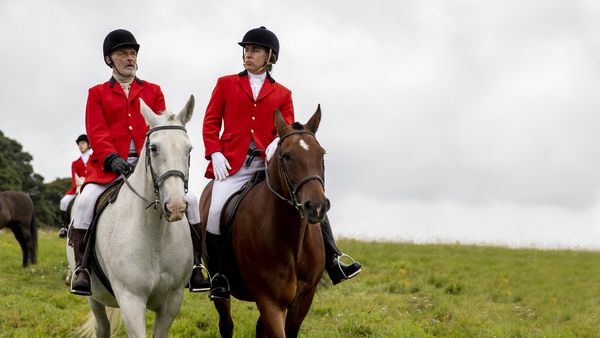 |
| James Lance and James Faulkner in Hounded Photo: Signature Entertainment |
One of this year’s most engaging British horror films, a hit at Frightfest and due to be released in digital formats on Halloween, Hounded is the story of a group of young, working class London thieves commissioned to go out into the countryside and steal from the rich. It boasts some great performances, especially from Malachi Pullar-Latchman and Hannah Traylen, and it feels very topical in its approach to class politics. On only their second job, the thieves find themselves set up, and they’re dumped in a field in order to be hunted by red-coated aristocrats with a pack of hounds. Whilst films about the hunting of humans are not exactly new, director Tommy Boulding successfully sells us the idea that this is a whole new world for his young protagonists, and he’s full of praise for the team which helped him to pull that off.
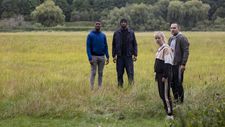 |
| Hannah Traylen, Ross Coles, Malachi Pullar-Latchman and Nobuse Jr Photo: Signature Entertainment |
He was initially approached by producer Ben Jacques with a pretty solid script, he says. That was back in May 2019.
“Ben and I have worked together previously on three or four different films. The very first short film I ever edited, Ben was the producer, and we've known each other for a good 15 years or so. He produced Hatton Garden Job which Ray [Bogdanovich] and Dean [Lines] had written before, for Signature [Entertainment], and they’d approached him with this script. And he approached Signature, and they were all excited by it. Obviously, it came to finding somebody to direct it.
“My background is ten years of feature film editing. Ben knew I was looking for an opportunity to try my hand at directing, and asked me if I'd be interested in reading the script, and I read it, and I loved it. I mean, we developed the script further after that, but even at that first read, it was already in a really strong place. I just thought it was a really cool concept. Yes, we've seen humans being hunted, and yes, we've seen the tables being turned on home invaders and things like that before, but I didn't feel like I've ever seen it done through the guise of British class and fox hunting, so I just thought that was a really interesting angle on it.”
It feels very much that it has captured the mood of the nation at the moment, I note, and he nods.
“I mean, obviously, three years ago, when it first landed on my desk, we were still in Brexit negotiations, so there was already a divide but the divide was, obviously, a leave/remain divide, whereas now it feels very much more like it's been turned the other way about, into a wealth and austerity divide. Let be be clear: I would never wish the country to be in the state that it’s in, but it’s pretty pertinent.”
Other things have changed over time, however. There’s a lovely moment in the film where the young protagonists hear a hunting horn but don’t recognise it and actually run towards it, thinking that it must be a car horn and indicate the presence of a road. Tommy says that he didn’t make that connection straight away.
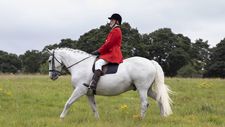 |
| James Faulkner Photo: Signature Entertainment |
“But obviously, the Hunting Act came in in 2004. I guess Malachi and Hannah, I would imagine they were only two or three, very young. So yeah, you're absolutely right. I mean, they wouldn't really know what it sounds like, or have any real notion of the whole ritual of it in order, all the paraphernalia, all of the coats and all of those sort of long held traditions. They wouldn't recognise that visually, audibly.
“One thing we talked about was just like, how often do city kids actually get out into the countryside in the first place, regardless of the absurd circumstances we're throwing them into in this film? Like, how many of them actually get to go out and just wander along, whether it's National Trust grounds or anything like that? They don't very often. And so even just being in that environment can be quite unsettling, quite disorientating.”
Did that influence the shooting of the early scenes where they're wandering around and exploring? Because they do seem quite lost.
“Absolutely, yeah. My little thing for keeping fit is just to go out running and I'd quite often go running cross country, wherever the public rights of way will take me, and it is amazing, you don't have to be very far out to like I live down in Medway, Rochester in Chatham, and you don't have to be very far out of town to all of a sudden not be able to see anything at all. I mean yes, you might have some semblance of civilisation with the telegraph wires and things like that, but when we were scouting for locations, on the location we found we saw a lot of the agriculture. The farming fields where they first get dumped were a 700 acre farm. I don't really have any grasp of what 700 acres means.
“The owners of the farm said ‘As long as you're not damaging our crops, you've got free rein.’ Then you suddenly start to realise how how big 700 Acres is. And we're just in this very small pocket of the Chilterns, near Luton, so we started exploring the area within the boundaries of their farm. And then we could walk for half an hour and still be on their land, and half an hour away from their farmhouse, which is pretty much the only building in the centre of this entire farm. You could spin 360º and you just wouldn’t see anything. And you have no idea where north is or what direction home is. We didn’t even know how we got into this field, and it was only five minutes ago. So it's very easy for the actors to get, completely absorbed by all of that.
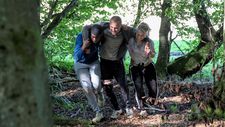 |
| Hannah Traylen and Malachi Pullar-Latchman Photo: Signature Entertainment |
“That said, in terms of cinematography, we very much spoke about making them seen very small on a very wide horizon early on, almost allowed the cameras to find them as they grew in stature within the film. But certainly to begin with it was a lot of, like, once that Landover drives off and it leaves them there to fend for themselves, let's get really wide and just show how lost they are.”
This led to the usual challenges involved in moving equipment around on a remote shoot, he explains, though it helped that they had a Landover in the story which they could also use for that, as well as a couple of off road vehicles.
“We were very selective in the way we filmed,” he says. “So quite often we were only 100 yards off the road, the farm track, but we were also very fortunate. We had no wet weather in three weeks, so we had pretty dry land to play with.”
They were also lucky when it came to finding locations within easy reach of each other.
“Our first location is a place called Markyate Cell. It was the house of a 17th century highwaywoman called Katherine Ferrers or Wicked Lady Ferrers. It was the very first house we looked at for this and Ben and I fell in love with it straight away. And so, in all honesty, we didn't look at another house, so we got really lucky with it. And it's a 15 minute drive from the farm, and the whole thing was within a 20 minute drive from Luton.”
We talk about the scenes in the house where the young people are wandering around. I venture that there's a risk of making them seem too angelic, but at the same time, we see very much how alien that world is to them, and that's very important for setting the tone for the film.
“Yeah, yeah,” he says. “The second job that they go on, I felt like it was an opportunity for them to be intimidated by wealth without actually having people there. And not in awe of it, but intimidated – I think that's quite different. I thought that was quite important. Because we shot at night, and we're quite, limited with the size of our lighting budget, we had to be quite selective, but actually, I think that played into our hands creatively. It was our only opportunity to do a ‘horror scene’ in a more traditional sense. And I wanted to have it as a representation of wealth to be quite scary itself. And just the age of it as well, the age of that aristocracy is also quite intimidating. I feel like there is 1,000 years worth of history to back these people up with their sense of entitlement. And I just felt all of those things added into that atmosphere.”
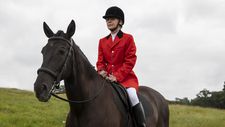 |
| Samantha Bond Photo: Signature Entertainment |
I ask him about the cast, and note that Malachi Pullar-Latchman really stood out to me in Shark Bait, because who brings that kind of sensitivity to a shark film these days? Tommy was the editor on that film
“We've been talking about doing this film since 2019,” he says. Now I didn't go on location for the shoot for Shark Bait until October 2020. We were going to shoot in the summer of 2020. Obviously then lockdown happened and it became very clear that we probably weren't going to be able to shoot Hounded in 2020, because there was the production boom and the recovery boom of the industry, and we were never going to be able to compete against that as a small independent film. So we always said that it was a case of right, we're going to shoot it 2021. So then I took the shark job and went out to Malta on production and met Malachi.
“I think we were out there for a total of about six or seven weeks. And I think within two weeks, I phoned Ben and said ‘If he’ll do it, I’ve found him.’ Not just from what I was seeing in the rushes from Shark Bait, but also just getting to know him, because I wanted a kid to represent London with a heart. When Malachi smiles, I think the world lights up. He's got such a beautiful face. The importance of it for me was that we were telling a story about yes, they do burglaries and yes, there’s questionable motivation about that and you can have your own opinion on that. But that doesn't mean that they’re bad. When I met Malachi prior to this, this is a good kid, he's come from a good home. And he's probably done some naughty stuff in his life, I'm sure. I just thought ‘This is the guy for me.’”
I ask about Hannah Traylen, who is also a standout in the cast. He explains Ben had previously worked with her on a video game.
“A bit like what I had done with Malachi for Chaz, Ben was really adamant. He said ‘I think I know who Vix is, I think this is the person to play this role.’ And obviously I didn't know who she was and Signature, who were financing the movie, didn’t know who she was, but as soon as I saw, I just was beaming. It just made me smile. Because, like Malachi, you knew they'd got it. And you knew that was the right person. It just fit straight away. I saw her audition tape and was like, ‘Yeah, she's got it. She's amazing.’
“I think having Vix and Chaz together, the way that Hannah and Malachi portrayed their roles, they're not always on the same team. But I think they had such great uniqueness about them as well. It's very sweet and, like, innocent. Even everything that he goes through, he still remains like strong at heart and really optimistic, but you can see that Hannah's had a bit more of an abusive past and she's more cynical, but funny with it as well. She has a bit more anger, but she's not an angry person.”
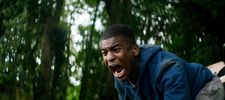 |
| Malachi Pullar-Latchman Photo: Signature Entertainment |
There’s a great dynamic within the group. I ask Tommy how he worked with people on set to build up that camaraderie.
“Honestly, we didn't have a lot of time to rehearse, just because of the size of our production budget,” he says. “But the four kids were basically hanging out because we were on set or staying in accommodation for the entire three or four week period that we were making the film. So they've just been hanging out with each other in the evenings and getting that camaraderie that way, which obviously just snowballs and gets better and better the further into production we got.”
People have been talking about how well shot the film is. Did his editing background help him to bring something distinctive to that?
“Well, I can't take credit for that. That was Martyna [Knitter] and she did a wonderful job. I've never worked with Martyna before but I saw a film she shot called Rose. It's very, very contained, in a cabin in the woods, about a married couple who are living outside of society, and then a third person comes in and upsets the balance. And it's a horror film, but it's not really played as a horror film. But she, Jennifer share it directly. So she, she's made a film called Rose and had seen a couple of years ago. And she only had 14 days to make this movie, and I was like, ‘Wow, they shot that in 14 days? It looks incredible.’
“I was just really blown away by that, so I emailed her and said, ‘Look, just taking a shot, do you want to read a script for a different movie?’ And she actually read it and loved it and signed on board. And then she really pushed for the anamorphic lenses, which make the horizons stretch much further. And she got that absolutely right. And we're using these really old lenses that she was in love with that are slightly disorientating, like, slightly stretched at the sides. And then, like I say, we got very lucky so we weren't contending with constantly changing weather. So it was a very, very consistent look. It was August we shot it, like late August, early September. The British countryside was in full bloom. So you point a camera at it and it looks pretty nice if you've got a good lens on it.
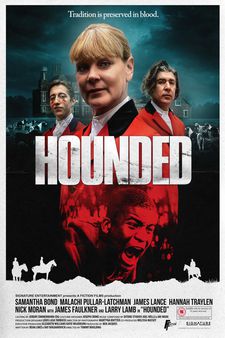 |
| Hounded poster |
“I did storyboard some key things like the more action scenes, the ambush and when they're first getting attacked by the dogs and things like that. But when we when we came to shoot it, it wasn't that I was tied to those storyboards. I wasn't locked in. I just needed to know, from an editing perspective, if they were running out of daytime, what shots do I need to have? And then if anything better came up on the day, then obviously we were free to go with it, as long as we felt that we already had the scene covered.
“It's tricky, isn't it, because you are going over old ground when you are doing an established genre? But it's trying to just make sure that each thing feels like your own spin on the trope, rather than just a direct rip-off of somebody else's that you've seen before. I do my best to try not to seem derivative. I mean, it's not always possible. But again, I have to give credit to Ray and Dean because a lot of that was already in the script. You could see where they've taken the executions and twisted them a bit.”
All that said, he reveals that he doesn’t really think of this as a horror film.
“I think it's more of a survival thriller with a few horror elements and adventure elements. They're constantly on the move. We never stop moving really apart from that sort of respite we get at the farmhouse. The scenery is constantly changing.”
I tell him that one of the reasons it stood out to me at Frightfest is that, whilst there’s a lot of good work screened there, a lot of it is quite similar and quite cynical in tone, whereas this quite a big element of optimism and hope. He agrees, and says that he was keen to tell a different kind of story.
“It goes back to what I wanted, for the film to have a heart. Even though we're talking about a survival thriller with horror element, I still think that can be enjoyable, and that was really important to me. I wanted it to have a sense of fun. Even though you are talking about class division in Britain and people are getting hunted – it seems slightly contradictory, but I felt like I felt like if it was handled right, we could make a social comment on the state of class division, kill people, and still have fun with it.
“I've worked on, and I really enjoy editing, some really dark subject matters. I don't know if they were cynical, but they're definitely not happy. I just didn't want that to be the stamp I had on a film. I felt like it was important for me to have something that had heart in it.”





















